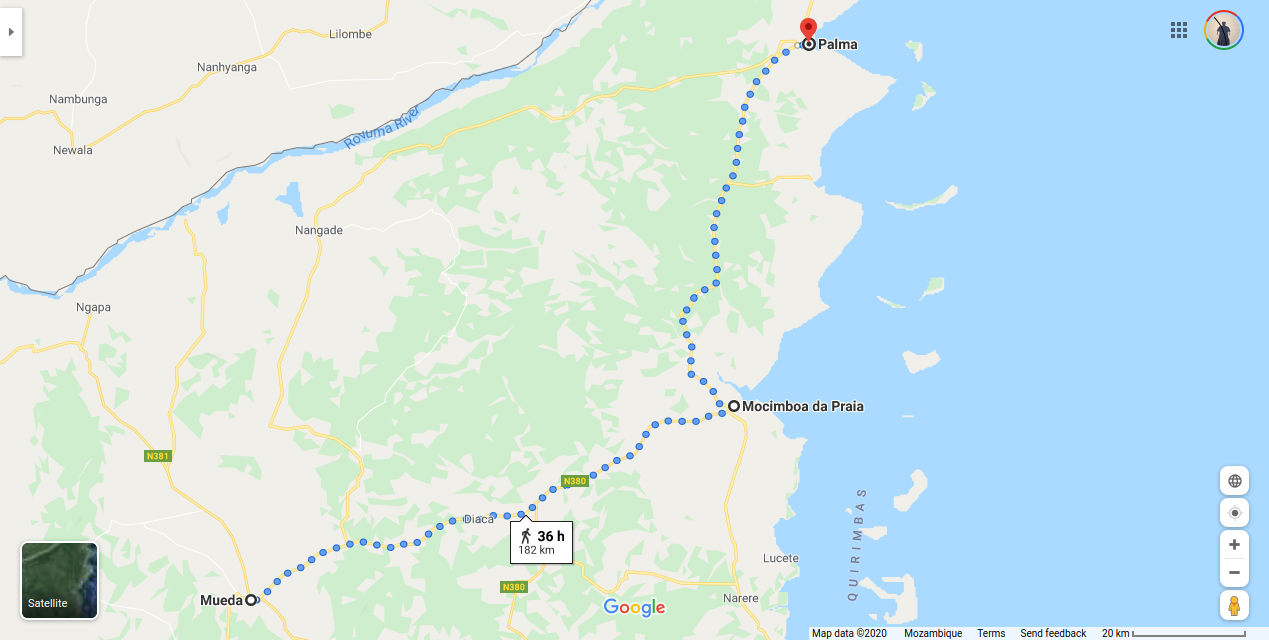Reports of arbitrary police brutality and lawlessness continue to emerge from Mocímboa da Praia, where state structures appear to have completely broken down and what was one of Cabo Delgado’s most important towns risks being completely abandoned.
Mocímboa has been largely destroyed by an insurgent attack at the end of June and by looting which has followed, largely carried out by members of Mozambique’s defence and security forces. The head of a local residents’ association, Paulo Weng San, told Mediafax today that the town of Mocímboa da Praia is in danger of disappearing if help is not sent soon.
The state has withdrawn entirely from the town, Weng San explained, apart from the defence and security forces who are seen locally as also being terrorists, Mediafax reports. People are leaving in droves as there is no health centre, no shops, no government, and they live in fear of the police and military.
One of the neighbourhoods which was least affected — Pamunda, which is home to Mocímboa da Praia port — has now been taken over by the police and military, and its old residents are not being allowed to return, a local source said.
Various military units have been stationed there to protect the port infrastructure and goods belonging to companies involved in the gas projects in Palma district, making it the safest area in town.
However, the few people who have tried to return to their homes there have been told they now have to find somewhere else to live. Soldiers or police have taken blocks from houses and used them to block the two roads leading into Pamunda, according to a resident of Kuliwayamba in Nanduadua, where people from Pamunda are now looking for places to live.
Police brutality
Police brutality started before insurgents staged their 27 June attack on the town. In the week running up to the attack, members of the police’s Rapid Intervention Unit and Special Operations Group carried out brutal searches of Milamba and Nanduadua — two neighbourhoods inhabited mainly by Muslims of Mwani ethnicity, who make up a large proportion of local recruits to the insurgency — stealing goods, abusing women and abducting men.
On 25 and 26 June, locals found 26 bodies abandoned near a bridge over the river Quinhevo. Some of them were identified as having been taken by police from the Milamba and Nanduadua neighbourhoods in the preceding days. Some of the bodies still had not been buried by the middle of July, for fear of provoking more reprisals from the police.
Refugees from Milamba, now living in the Cabo Delgado capital of Pemba, this week told Zitamar that a claim that government forces found caches of weapons in their neighbourhood is untrue. One report on Twitter on 26 June said that weapons were found in Milamba on 22-23 June — but Zitamar’s sources now say that was not the case.
A separate report on 14 July, on the website Notícias de Defesa, claimed government forces had discovered an insurgent weapons cache in Nanduadua on 13 July. The allegation was repeated on 15 July by Portuguese commentator Nuno Rogeiro. But according to a source who was living in Nanduadua — and who is now living as a refugee in Mueda — the weapons were more likely left there by members of the government forces who fled the fighting in Mocímboa da Praia along with civilians, having ditched their arms and uniforms.
Speaking with Zitamar News in Pemba, the refugees from Milamba said the members of the government forces should be held responsible for their actions, which killed innocent people and which did not stop insurgents attacking Mocímboa da Praia days later.
This article was produced by Zitamar and Mediafax under the Cabo Ligado project, in collaboration with ACLED and with support from Crisis Group. The contents of the article are the sole responsibility of Zitamar News.









